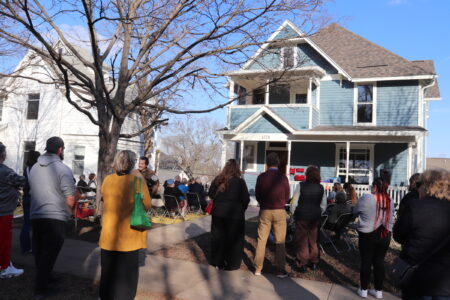Visiting Nurses Association continues home health care visits, creates COVID-19 team

photo by: Contributed Photo
Debbie Ahlert-Caffey, the director of clinical services for the Visiting Nurses Association, takes a patient's heart rate and oxygen saturation levels on Jan. 20, 2020.
Many clinicians are fighting the spread of COVID-19 from hospitals and office spaces; others are meeting at-risk patients in the patients’ own homes.
The Douglas County Visiting Nurses Association has not shied away from conducting home visits during the pandemic, and three employees have volunteered to work with clients suspected of having COVID-19, should the situation arise.
“This is a situation that’s unsettling for anyone in health care right now. But really I’m very inspired by the staff response to all of this,” said VNA CEO Cynthia Lewis.
The VNA, a nonprofit that celebrated its 50th anniversary last year, conducts home visits to patients to provide health care, hospice care and nonmedical care such as taking patients to medical appointments or doing their grocery shopping. The organization tends to people of all ages, but more than 77% are age 65 and up, the Journal-World reported last year.
The VNA currently serves about 225 patients, Lewis said in a phone interview on Monday. The age of the majority of these patients places them at high-risk for contracting COVID-19.
Three nurses on staff have volunteered to treat patients who are presumptive positive for COVID-19 or who were hospitalized due to the virus but have since stabilized and returned home.
“We wanted to pick a COVID team because we did not want our nurses who were exposed to positive clients to be around our routine health patients,” said Debbie Ahlert-Caffey, the director of clinical services for the VNA and one of the three members of the COVID team.
Ahlert-Caffey said that everyone was willing to be part of the team, but she chose the members based on safety factors and the least risk of exposure to the members’ families.
The VNA plans to begin by sending out one nurse to see these patients and will add the other team members as the need arises. She said one of the biggest worries on employees’ minds right now was expectation of the likely surge in cases.
On Friday, KDHE Secretary Lee Norman said data suggested that Kansas’ coronavirus spread would peak in mid- to late April and predicted that Kansas could record at least 900 cases.
“I have no doubt that VNA and all the home health agencies in town will rise to this challenge,” Ahlert-Caffey said.
While home health agencies are at risk of exposure, Ahlert-Caffey said clinicians who work at hospitals “are so much more at risk.”
She noted that the staff at VNA was able to prepare before each home visit, whereas hospitals receive walk-in patients and clinicians must quickly transfer between patients. Ahlert-Caffey said employees of the VNA were “at low risk” compared with clinicians in hospitals, so long as they have the proper personal protective equipment.
Lewis said the organization currently has about a three-month supply of gloves but only a two-week supply of gowns and N95 masks. They have been receiving homemade masks from members of the community, she noted.
Lewis said some patients have asked for services to be put on hold during the pandemic. She also said staff members were screening patients before each visit by asking them questions. Two-thirds of the office staff is working remotely.
If staff members were to exhibit symptoms of COVID-19, they would self-quarantine until a test result came back negative, Lewis said.
More coverage: Coronavirus (COVID-19)
As the pandemic continues, the Journal-World will be making coverage of COVID-19 available outside of the paywall on LJWorld.com.
Find all coverage of city, county and state responses to the virus at: ljworld.com/coronavirus/
Please consider subscribing to support the local journalists who are helping to inform our community: ljworld.com/subscribe/
What to do if you think you may have COVID-19
Patients who have symptoms — difficulty breathing, cough and fever — should stay home, immediately isolate themselves from others and call their health care providers. Patients should never show up unannounced at a medical office or hospital. Instead, they should call ahead to explain their symptoms and give health care workers the ability to minimize the risk to others.
If patients do not have health care providers, they may call the Lawrence Douglas-County health department’s coronavirus line, 785-856-4343.
For updated information on the outbreak, Kansas residents can email COVID-19@ks.gov or call 866-534-3463 (866-KDHEINF), which is staffed 8 a.m. to 7 p.m., Monday through Friday; 10 a.m. to 2 p.m. Saturday; and 1 p.m. to 5 p.m. Sunday.
More information can be found through the Centers for Disease Control and Prevention’s website, the Kansas Department of Health and Environment’s website or the Lawrence-Douglas County Public Health website.







